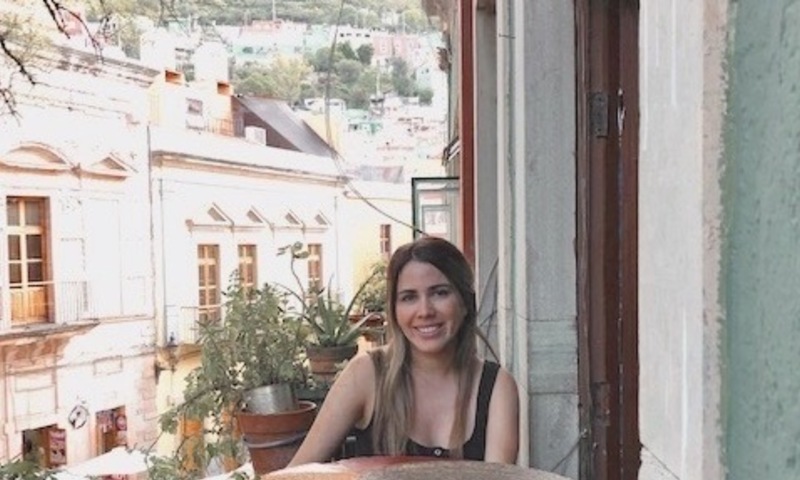New things happening at Grit! We are starting a new #WomanCrush series on our socials to showcase inspirational female Faculty, Staff and students. Tonight we’re kicking it off with Dr. Itzel Reyes.
GRIT: You earned your bachelors in Spanish literature with minors in Sociology and Women's studies. What drove you to study these?
IR: I think they all in one way or another have to do with being unseen or underrepresented or not represented at all. In this particular society and in our country with the Spanish language, many people reference it as a foreign language even though when you look at the facts, it's not. If you look at it from the historical perspective, and in sociology, which looks at the systems from a social perspective, that helps us understand how certain injustices or oppressions are perpetuated across different historical timelines and across different people “groups” as well. Woman studies is another one, so as a racial minority and I was very aware also of how my womanhood played out, particularly when in school or sports even. I was very interested in seeing how these three connected, to ultimately raise awareness but also have a voice- a more informed and educated voice that could allow me to help others fix systems and help women or minorities flourish in this country.
GRIT: You say you see the work you do for Biola as an educator and professional as your ministry. Can you expand on that?
IR: I think that we come to University to learn, right? But we've also been learning some things incorrectly all our lives so there's also a lot of things that we have to unlearn. And that’s a lot of work of the heart in a way- so it's not only intellectual and cognitive but it's also through the heart, right? And so how do we help students and members of our community learn, but also unlearn things that have ultimately served to oppress whether it's women or people of color. I think initially I was kind of rough around the edges. We all want to go out and see this as an issue and we see the destruction that it creates and so you're passionate but you're also kind of aggressive in a way. Through my years here at Biola, I have (myself) had to learn and unlearn how to present this to students and how to help them in this journey. I have had to remind myself and know that my male students are not female students and so can’t have their experiences, my white students are not people of color and so they don’t have those experiences, and so how do I guide and take them along the journey of understanding in order to really become a better Christian in a way. And really, I see this as reciprocal learning and so it’s not only me assuming a position of authority, and guiding people along but also, like I’m learning a lot from my students and from other members of this community as well
GRIT: Every woman has a unique story. How have your life circumstances shaped you/your life path?
IR: My parents are Mexican immigrants so I was raised in a low-income, predominantly Hispanic community, I also became a mother when I was 19 so that really impacted my life because I had a newborn at that age and also was enrolled in school. I was privileged in the way that my parents were married, right, my parents owned their own home, and they were very involved In my education and really instilled in me the value of becoming educated (within their capabilities). And so while they didn't really understand the American school system, they understood that it was very important in order to be successful in this country. Sports actually played a really big part in my life as well, I played soccer in highschool and community college, and I think it was through sports that I learned how to be self-confident and a lot of it was mental. Like ‘OK you're tired.’ ‘OK you have performance anxiety because you have to go in and play in front of people constantly.’ I was lucky to have really good coaches who taught us in terms of how to develop skills with the ball, but also a lot of mental and emotional work; how to believe in ourselves, how to be able to perform and truly trust ourselves and trust each other as we’re also attempting to ultimately win.
GRIT: What's something you have accomplished/a trial you overcame in your life that you’re proud of?
IR: The PhD I think was the biggest accomplishment in my life besides the fact of giving birth to my son, which is a big accomplishment as well. Like, ‘Yes he’s alive and well, he's fed every day!’, which is a daily accomplishment. I think my PhD because it was such a journey. It's not like you wake up one day and suddenly you have a diploma in your hand. It was filled with second guessing myself, and ‘imposter syndrome’. Like ‘I don’t belong here, what am I really doing here? The people around me are speaking so eloquently, using these very fancy words, I really don’t know what they’re saying. Can I use those words?’. I felt silly at first using a certain type of vocabulary. So how do you learn to develop a certain kind of speech that will tell people that you belong to the intellectual sector? It depends on who you're around. And because I didn't have the social influences in my life (that others did). My parents don't have a college education- my dad didn’t even graduate elementary school, despite which, he’s a very smart man. Because I didn't have that social atmosphere that would enable me to pass in those intellectual circles, I struggled. Every time I was going to class or went to give a presentation, I was very aware of how I sounded, not only because in certain circles I don't I don't have a “standard” accent right, but also because of the words that I was utilizing.
When I was working on my bachelors I was thinking, ’Am I really worth it?’ Am I capable of doing this? But I'm just from this certain community and all of my friends are pregnant, and I am also pregnant, but they’re not going to school’. Graduating high school in my community was the biggest accomplishment. They didn’t talk to us about going to college. I didn't know what a PHD was until I was in the third year in undergrad and a professor shared asked me if I wanted to pursue a higher degree and I pretended I knew, said “yeah let’s do it”, went home and googled it. That has been the biggest hurdle for me, I think especially because I became a single mom and I and I was, in a way a stereotype gone wrong, in opposition to people and society thinking that I was only going to get to a certain level or place in life. I was battling these stereotypes, but at the same time that was empowering. I’m really competitive. So I think even though my circumstance put me at a position where I felt disadvantaged, I also felt empowered at the same time, precisely because of my personality and the mentality of, `You don’t think I can do this? Well let me show you.” I became a Christian as an adult, and in grad school that was a great source of my confidence, it came through my relationship with God, sports, and my relationship with my dad.
GRIT: Was there a person or person(s) who encouraged you in your identity as a woman?
IR: It actually was my dad, which is crazy especially from the Hispanic culture which is usually very patriarchal, male-dominated and sometimes sexist, and so my dad never put any kind of barrier for me simply because of my womanhood. If I wanted to run around and play with dirt, play with the boys, in my family upbringing I was able to do that. I didn't understand that I wasn't supposed to do that based on societal standards. I went riding go-carts with him, played sports, watched sports, went to soccer games...there was never an explicit or implicit message from him that told me “You’re a girl so you can’t do this.”
I think that he really empowered me without realizing, whereas my mom fed into more of the “women shouldn't do this or that ''. So when we talk about things like sexism or patriarchy, we all are involved in this mess. We all believe the story “Oh yeah (women) are inferior, or maybe we shouldn’t do this or that''. I think my mom believed that story whereas my dad just saw me as his child regardless of my gender.
GRIT: Give a message of encouragement to the women of Biola.
IR: I think self-imposed limitations are the biggest hurdle for us. We limit ourselves and put limits on ourselves, so I am 33. And as a 33-year-old woman, I started running. I ran my first race last week, I travel a lot. And people are like ‘How? Why? You’re 33 and have a son.’ And I’m like ‘So what?’. I don’t know if some of that is cultural, but overcoming whether limits are internal or externally being communicated to you. Oftentimes we don’t really have a good reason for thinking these things. Like why shouldn’t I start running even at 33, or 43, or 63? We tend to view certain seasons and associate them with certain activities, or even with having kids like, ‘Your life is going to be over when you have kids.’ And really, yes your life is going to change but it's not over. We are always expected to serve others, and serving is good, serving is a Christian value, but we need to be careful with this one because in our society we as women are the ones constantly expected to serve, nurture, nurture, nurture, and pour into others consistently. And it’s all too often that when we are pouring we forget to take care of ourselves. And self-care for me is not the selfish like ‘OK I'm shutting down the world to focus on me’, but you do need to focus on your spiritual relationship with God, focus on those activities that are life-giving to you, that provide you nutrients-whether those are Spiritual or physical, and not be so consumed by serving and nurturing that you forget yourself. In a way, that would be counterproductive because you’re positioning yourself in so that you can no longer serve others because you are so deteriorated and depleted. So- fighting expectations and taking a step back when people have assumptions about or expectations of you, I think are important. Analyzing situations instead of just following the culture/trends, would be my biggest piece of advice. In a way, for women who are in this movement specifically, we are rebels. And rebels are sometimes punished in this society. But rebels are also the ones who make change happen right. I think a little rebelliousness in appropriate places and spaces is okay.
Ultimately, the struggles of and disadvantages that we face and what I mentioned previously are also part of what strengthens us as Christians, as humans, as women- and that is knowing how to overcome barriers that have been imposed by society, and being able to change things. Know that you have power. You have individual power and you have collective power as women to be able to make the changes necessary to improve the social stance of women. Being able to have these conversations, being able to inspire and be inspired by other women, I think that is, in a way, what makes being a woman special.
 Biola University
Biola University



